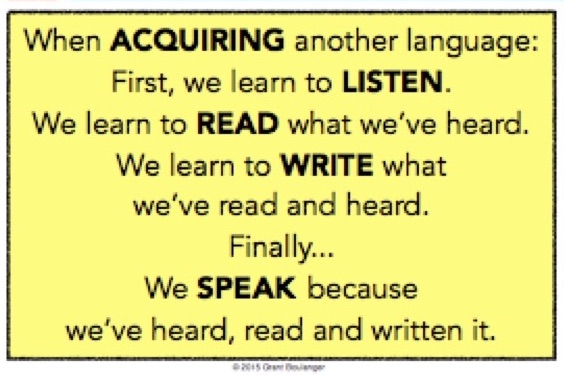- Vocabulary - learn and practice - quiz
- Grammar - learn by taking notes and practice - quiz
- Test on grammar and vocabulary
- Focus on accuracy and filling in the blanks
- Not a lot of "communication" focused activities
- Lots of English
- Communicating
- Acquiring the language
- Lots of stories

I frequently referred to that poster with my Spanish 1 students and they got it. I will continue to that with my new students.
So, what is my plan with these new students? How can I convince them that this is a better way?
In both classes, I am starting with units revolving around stories based on music videos and Estrella del Día (this semester's questions). That is an easy hook with students because who doesn't love a good song/music video and it is authentic/real.
For Spanish 2, I am using the story based on the song #Idiota (free updated unit packet here). And for Spanish 3, I am using the story based on the song "Bailo la pena".
My big focus is presenting, on day 1, these Essential Questions and Enduring Understandings. (I have to have these for all my units.)
Preguntas Esenciales:
- What is the difference between learning a language and acquiring a language? Which will help me to be able to communicate?
- Do songs/stories help me to acquire the language? If so, how and why?
- (Spanish 3) What helps me to alleviate and overcome sorrow?
- (Spanish 2) What effects can social media have on a relationship?
- How are the cultural products, practices, and perspectives in the song/story "Bailo la pena" or "#Idiota" similar and/or different to mine?
Enduring Understandings (Students will understand that):
- Acquiring a language feels easier compared to learning a language.
- Acquiring a language involves lots of listening, which then leads to → reading → writing → and finally speaking.
- Acquiring a language will lead to communication.
- However, language acquisition is slow, piecemeal and different for everyone.
- In order to acquire high frequency structures and vocabulary, a lot of repetition and input are required.
- An engaging story, images, and acting help me to acquire the language in an enjoyable way.
- (Spanish 3) There are a variety of ways to alleviate and overcome sorrow. One way, as illustrated in the song/story "Bailo la pena" is through music, dance, community, and helping others.
- (Spanish 2) Social media can have a variety of impacts on a relationship, both positive and negative.
- The cultural products, practices, and perspectives in the song/story "Bailo la pena" OR "#Idiota" are similar and different to mine.
I will also explain the evaluaciones, which do not involve filling in the blanks with vocabulary words and/or the correct verb conjugations. Nor is there is there a big focus on accuracy!
Both classes will have similar evaluaciones during the units:
- Interpretive Listening and Reading AND (some) Presentational Writing: Edpuzzle (example)
- Interpretive Listening: Listen to parts of story and identify the picture.
- Interpersonal Writing: Answer questions about yourself (related to story)
- Interpretive Reading: Cierto/Falso about story
- Presentational Speaking: Oral retell with pictures to help.
- Presentational Writing: Write an original story with similar themes, vocabulary, and structures.
- Interpersonal Speaking (Spanish 3 only): Simulated conversation
- Presentational Writing: Cultural Comparison
I am also explaining my expectations for class -- Students have to respond to me and interact during the class. They don't have to "talk" a lot, but they do have to "communicate" with me. They cannot just sit and absorb!
Something else I am doing (but will eventually not do): Give them a "vocabulary list" and a Quizlet (these students really think they need one!) but we never really go over it. At the end of the unit, take out the "vocabulary list" and ask, "How did we acquire all of these structures?" Hopefully, they say, "through communication and interacting with the text in a variety of ways!"
I am hoping I can win these students over earlier than I usually do!
No hay comentarios:
Publicar un comentario